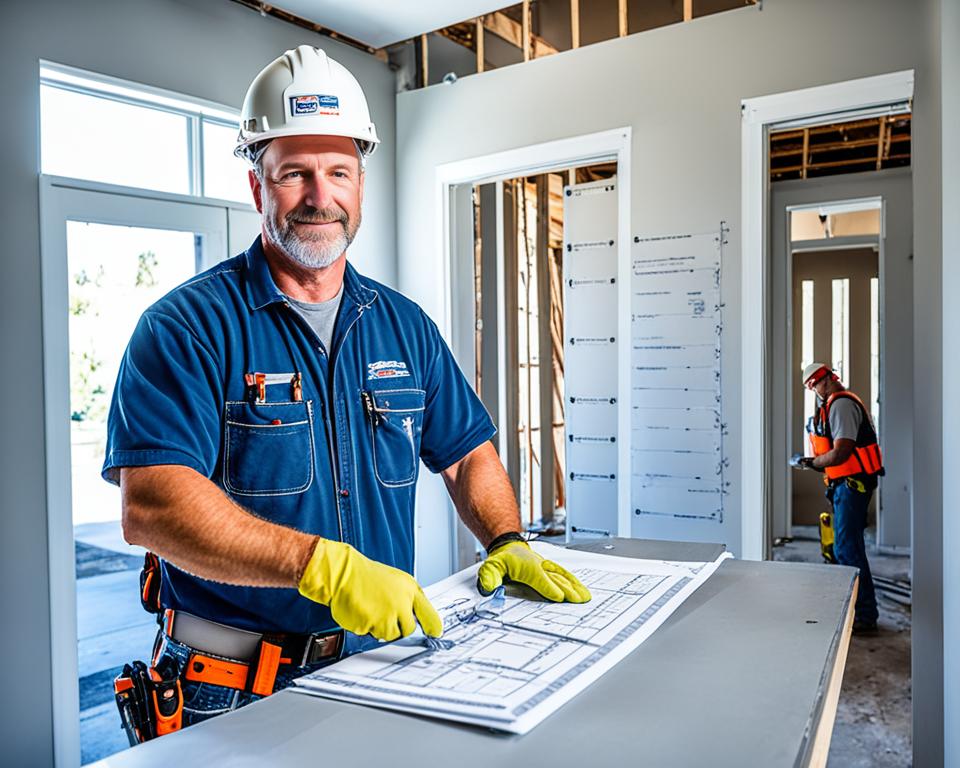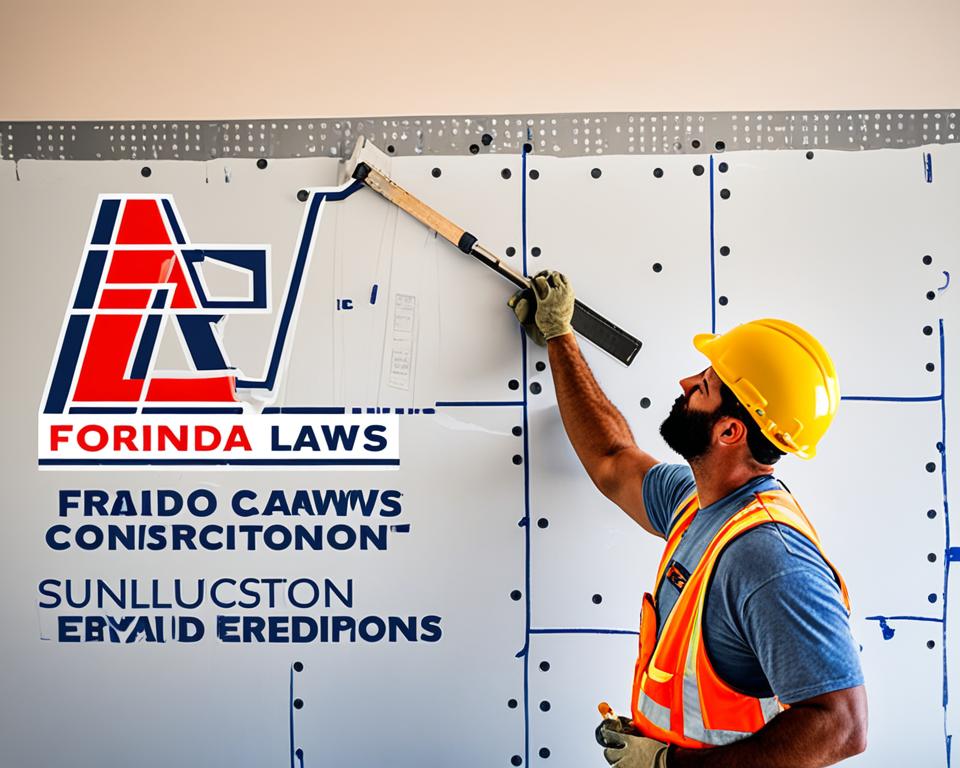Have you ever wondered if you really need a license to install drywall in Florida?
In Florida, it’s not just advisable but legally mandatory to hold a contractor’s license if you’re planning to install drywall. This includes working with materials like gypsum, wallboard, and sheetrock. The licensing process isn’t something you can skip, as it ensures safety, quality, and compliance with state laws. A Florida drywall contractor collaborates frequently with other contractors, homeowners, as well as business or building owners.
The scope of work for a specialized gypsum drywall contractor includes installing metal accessories and non-load bearing metal structures, along with preparing surfaces for drywall. But forget about plastering or dealing with block or wood partitions; that’s outside the scope. To get licensed, you need a high school diploma or equivalent and about four years of experience under a Licensed Gypsum Drywall Contractor or Division I Contractor. Plus, you’ll need to show hands-on experience in light steel framing, gypsum board, and finishing.
If you’re aiming for a career in Florida’s drywall industry, these requirements and the certification you earn from fulfilling them ensure you can meet the high standards the state enforces. So, if you thought you could wing it without proper certification, think again. License ensures not just adherence to Florida construction licensing laws, but also establishes your credibility in the business.
Understanding Florida Drywall Installation Regulation
I’ve come to realize that Florida drywall installation regulations are not just a formality but a necessity. Anyone partaking in any construction activities—whether it’s demolition, building, or improvement of structures for compensation—needs a license from the Department of Business and Professional Regulation (DBPR). This ensures that everyone involved is accountable and follows the Florida building codes.

Now, when I was exploring the specifics, I found it fascinating that Florida requires individuals to obtain a gypsum drywall contractor license to legally install drywall. The requirements are quite comprehensive. They include four years of experience under a Licensed Gypsum Drywall Contractor or Division I Contractor. During these years, the experience must cover areas such as light steel framing, gypsum board, and finishing. At least one year in a foreman role is necessary.
Knowing how stringent these rules are, it becomes clear why entities like Licenses Etc. have been so pivotal. They’ve helped contractors navigate these hurdles for 13 years in states like Florida and Georgia. And it’s not just about the technicalities; they simplify the process, offering guidance every step of the way until individuals obtain their licenses.
Moreover, it’s worth noting that some states might differ, with some requiring a general contractor’s license while others necessitate a specialty one for drywall. However, in Florida, the focus is clear. The importance of verifying licensure is paramount for both contractors and consumers, ensuring the work meets regulation standards for safety and quality. For any contractor, this is a critical step, and overseeing that your installation permits in Florida are up-to-date can prevent unlicensed activity and its potential ramifications.
Do You Need A License To Install Drywall In Florida?
For those wondering, do you need a license to install drywall in Florida? The answer is a resounding yes. Florida is serious about maintaining high standards in the construction industry, and that includes drywall installation. Whether it’s for residential, commercial, or industrial projects, a contractor’s license is mandatory before you start doing any substantial drywall work.
So, how to get a drywall license in Florida? It’s a journey that requires a good deal of commitment. To begin with, individuals need four years of experience working under a Licensed Gypsum Drywall Contractor or a Division I Contractor (like RC, BC, GC). However, if you have college credits in related fields, you can reduce this requirement by up to three years, making it a bit more accessible.

An essential part of the licensure process includes having at least one year out of those four years working as a foreman. This demonstrates your capability to take on leadership roles and ensures you have substantial hands-on experience, especially in areas like Light Steel Framing and Gypsum Board finishing.
Another crucial element to obtaining a drywall contractor license in Florida is passing the relevant examinations. The exams cover not just the technical aspects of drywall installation but also business operations. The total examination fee for first-time applicants is $295. The Gypsum Drywall Trade Knowledge exam lasts five hours with 80 questions, while the Business and Finance exam is a six-and-a-half-hour ordeal with 120 questions.
But it’s not just about passing exams and gaining experience. Applicants also need to demonstrate financial responsibility. If your credit score is below 660, you’ll be required to submit a bond or irrevocable letter of credit. Interestingly, you can meet 50% of this requirement by completing a 14-hour financial responsibility course.
Lastly, it’s crucial to secure the necessary insurances and complete background checks. This includes public liability, property damage insurance, and worker’s compensation insurance or an exemption within 30 days of your license issuance. Missing out on any of these steps can lead to legal issues, so it’s best to ensure you’re fully compliant.
In sum, how to get a drywall license in Florida is a structured process designed to maintain high safety and quality standards. By ensuring you’ve met all requirements, you’ll not only avoid legal complications but also enhance your professional credibility in Florida’s construction industry.
Types of Licenses Required for Drywall Installation
When it comes to installing drywall in Florida, it’s important to know the types of licenses required to operate legally. The Florida Drywall licensing requirements are pretty specific, and understanding them can save you from a lot of headaches.
Now, let’s dive into the two main licenses recognized in this field: the Gypsum Drywall Specialty Contractor License and the General Contractor License.
Gypsum Drywall Specialty Contractor License
The Gypsum Drywall Specialty Contractor License is designed for professionals focusing solely on drywall installation. If your primary task is setting up metal aspects and installing drywall products, this license is the one for you.
- To obtain this license, you need to pass a Business and Finance exam and a Trade Knowledge exam.
- Both exams are computer-based and come with an examination fee of $295 for first-time licensees.
- The Gypsum Drywall Trade Knowledge Exam is a 5-hour, 80-question open-book test.
- The Business and Finance Exam extends for 6 hours and 30 minutes and includes 120 questions.
General Contractor License
On the other hand, the General Contractor License allows you to oversee a wider range of construction activities, including drywall work. This flexibility makes it a suitable option if your work extends beyond just drywall installation.
Here’s what you need to know about the types of licenses required for drywall installation through this route:
- The same rigorous experience and educational background apply as with the Gypsum Drywall Specialty Contractor License.
- You’ll need to pass the relevant exams to validate your capability in performing quality, code-compliant work.
Whether you choose the Gypsum Drywall Specialty Contractor License or the General Contractor License, meeting the Florida Drywall licensing requirements is essential. Both licenses uphold the standards necessary for maintaining safety and quality in drywall installation.
Steps to Obtain a Drywall License in Florida
Acquiring a drywall contractor license in Florida is a structured process that ensures you are fully qualified to handle the job. Let’s break it down step by step.
Educational Requirements
First off, the drywall licensing requirements in Florida start with education. You need at least a high school diploma. A four-year degree in a construction-related field from an accredited college can also be beneficial, as it may reduce the required experience by up to three years.
Experience Requirements
Experience is crucial. To meet Florida Gypsum drywall contractor license criteria, you need a minimum of four years of experience under a licensed Gypsum Drywall Contractor or Division I Contractor. One of those years must be in a foreman role. For veterans, relevant military service and work experience can count towards these requirements.
Examination and Application Process
Next comes the testing phase. You need to pass two exams: Business and Finance, which is a 6-hour and 30-minute exam with 120 questions, and a Trade Knowledge exam that lasts 5 hours with 80 questions. The total examination fee is $295. After passing the exams, the application process involves submitting documents proving your experience and financial stability. Applicants with a credit score below 660 will need to submit a bond or irrevocable letter of credit. Also, you must undergo a background check, including fingerprint submission.
If you’re unsure about any part of the process, consider hiring licensing experts such as Licenses Etc., who have been simplifying the drywall licensing requirements in Florida for years.
Conclusion
The new Florida law, effective July 1, 2021, drastically changes the landscape for contractors by eliminating nearly all local contractor licenses by July 1, 2023. This shift centralizes licensing under the Florida Department of Business and Professional Regulation (DBPR), standardizing the process and ensuring statewide consistency. Local governments can no longer impose or modify licensing requirements for various trades like painting, flooring, cabinetry, interior remodeling, and specific others listed in Fla. Stat. § 489.117(4)(a).
That brings us to the central question: Do You Need A License To Install Drywall In Florida? Absolutely. With the transition to DBPR oversight, drywall contractors must ensure they meet the necessary licensure requirements to operate legally. This includes obtaining a certification from the DBPR, which requires a combination of field experience, supervisory experience, and passing relevant exams. The state has maintained stringent standards to ensure quality and safety in drywall installation and other construction trades.
Understanding Florida contractor licensing for drywall isn’t just about legality; it also speaks to professional integrity and safeguarding both contractors and clients from potential risks. Licensing requirements adopted before January 1, 2021, will remain in effect until July 1, 2023, ensuring a smooth transition. For drywall installers, this means adhering to Florida’s construction standards and maintaining a licensed status to avoid legal issues and uphold the industry’s quality standards. By following the correct procedures, you will not only stay compliant but also build a credible reputation in Florida’s competitive construction market.

